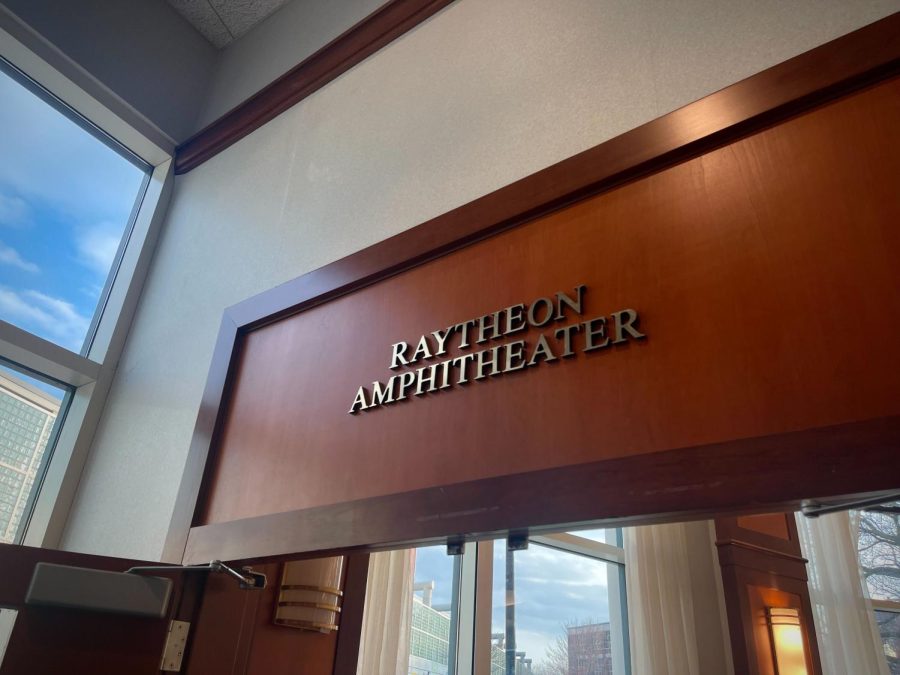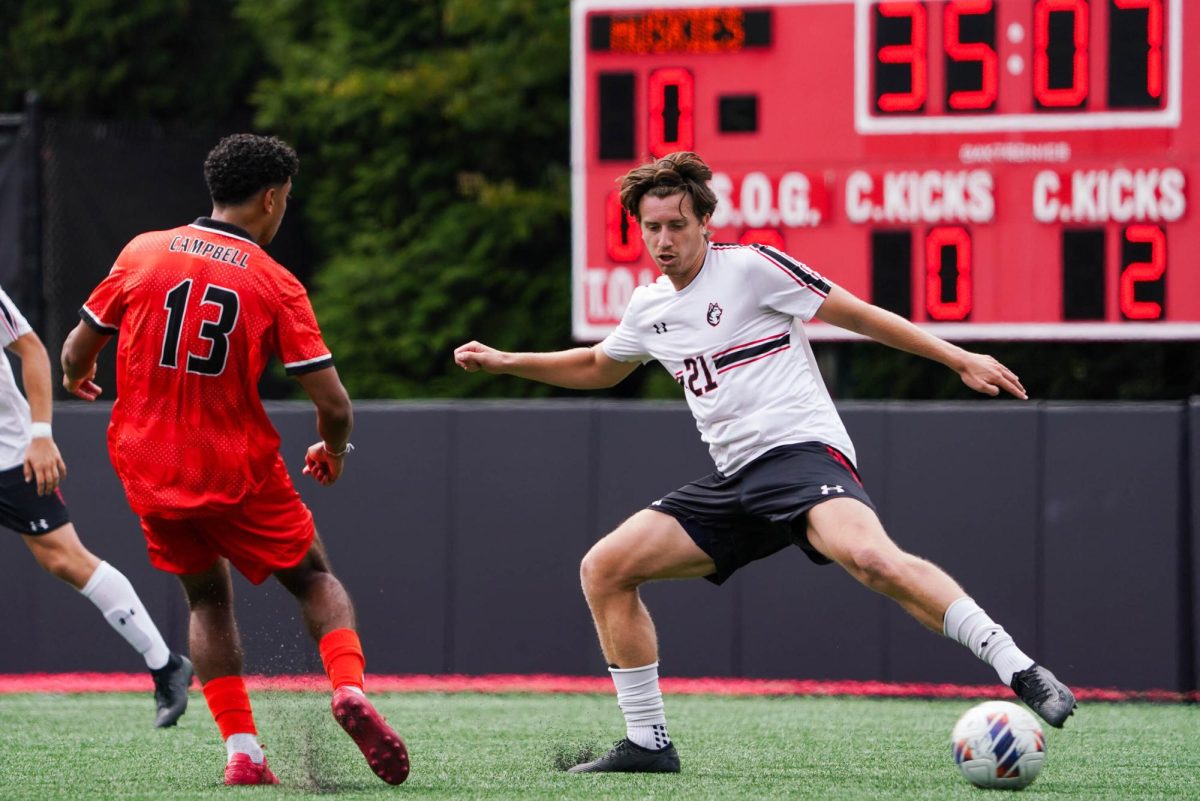SGA passes bill calling on Northeastern to sever ties with private military companies
The entrance to Raytheon Amphitheater, located inside Egan Research Center on Northeastern’s campus. Raytheon has been the subject of controversy among Northeastern students, who argue accepting donations from private military companies contradicts the university’s social justice values.
April 11, 2023
After hours of intense debate, a resolution that would push Northeastern administration to halt the university’s collaboration with private military companies — including terminating research contracts, financial holdings and campus recruiting events — passed in the Student Government Association, or SGA, March 13.
SR-SP-23-104, written by members of the Progressive Student Alliance, or PSA, claims companies that manufacture military technology directly profit from war and produce weapons that have been used to commit war crimes. The legislation specifically focused on Raytheon Technologies, one of the largest aerospace and defense conglomerates in the world, a longtime donor to Northeastern with an amphitheater in its name on campus.
“Northeastern claims to have social responsibility. It claims to care about social justice,” said Kyler Shinkle-Stolar, a fourth-year biology major and the main author of the legislation. “It shouldn’t be supporting industries that are causing so much harm.”
Northeastern has not made its endowments and tax documents public, making it difficult to know the extent of their work with Raytheon and similar companies. Top executives from Exxonmobil and Raytheon have served on Northeastern’s executive board in the past, creating what Shinkle-Stolar called a “conflict of interest.”
Human Rights Watch called for an end to U.S. arms sales to Saudi Arabia after they linked a bomb made by Raytheon to an attack on a worker’s shelter in Yemen in 2016, which was the 23rd time they linked U.S. supplied weapons to unlawful attacks in the war and the fourth time these weapons were produced by Raytheon.
“These companies profit so much [from war], make billions and billions of dollars and then end up investing that money and just creating more weapons,” Shinkle-Stolar said. “When there’s a question of whether we should send weapons to a country, they lobby for weapons to be sent.”
According to a study by the Watson Institute for International and Public Affairs, the Department of Defense increased its military budget after the Sept. 11, 2001 attacks on the Twin Towers by more than the entire military budget of any other country, topping $4.4 trillion for projects that primarily benefit corporate contractors. The main benefactors of this spending surge have been five major corporations Northeastern has worked with in the past, including Lockheed Martin, Boeing, General Dynamics, Raytheon and Northrop Grumman. While military spending has come down since 2010, it remains historically high.
The SGA legislation also rebuked the environmental harm contributed by private military companies through their perpetuation of war and production of military equipment. According to a report by Scientists for Global Responsibility, militaries are responsible for 5.5% of global emissions, and military waste often utilizes hazardous substances which are often improperly disposed of.
Students who spoke out against the legislation raised issues with how this decision would impact students in majors that rely on private military companies for co-ops and internships. The university hosts recruiting events and job fairs with Raytheon, which advertises “over 200 open engineering positions for recent graduates … as well as opportunities for students seeking co-ops and internships” on Northeastern’s website.
“I would be very concerned should Northeastern cut research contracts and events with these companies due to how impactful those co-ops and first jobs can be for resume building,” said Nicholas Talleri, a first-year mechanical engineering and design combined major. “I would work for these companies, but not go out of my way to join [them] compared to a similar job elsewhere.”
Mikhail Ankudovych, a Ukrainian first-year data science and economics combined major and SGA member who spoke against the legislation, mentioned private military companies’ roles in supplying weapons to maintain international security.
“My family is in Ukraine and there are some missiles being produced by companies like Raytheon that are keeping my grandmother’s apartment an apartment and not a pile of debris,” Ankudovych said.
Raytheon ceased operations with Russia in April 2022, though the company was still deriving a large part of their revenue from working with the country up until this decision. Neil Mitchill, Raytheon’s chief financial officer, told Reuters their revenue would be lowered by $750 million because “direct and indirect sales … are no longer allowed because of the global sanctions imposed on Russia.”
Despite the expected reduction in profits, Raytheon and the other four major weapons manufacturers saw an increase in value of their stocks by 12.78% in the year following Russia’s invasion. Most of their revenue came from government contracts to deliver defense weapons to Ukraine.
While Ankudovych agreed that there should be more transparency and communication between students and administrators about this issue, he was doubtful this legislation would change much in regard to who the university works with.
“I agree that [executives being on Northeastern’s board] is a conflict of interest, but I think that’s just the nature of the board of trustees at a corporation,” he said. “In terms of estimating legislation scope, I don’t think this is going to change much.”
Shinkle-Stolar said that, if taken up by the university, the legislation wouldn’t explicitly stop students working for these companies, but it would halt Northeastern from actively promoting and funneling students to work for them.
“[This decision] is not going to change that much economically. But once an institution does something like this, it starts to set a certain standard for other institutions, and it starts to change the nature of how this industry works,” he said.
At a Raytheon recruitment event held March 15, campus programs recruiter Rebecca Kuzmich told The News that it was a “personal decision” of employees to work for the company.
Northeastern did not respond to requests for comment.
In the past, students have fought for university divestment from companies doing business in South Africa to protest apartheid. Anti-apartheid protests began in the 1960s, and by 1988, 155 colleges had at least partially divested.
While historically colleges were the first to initiate disinvestment, 90 cities, 22 countries, and 26 states soon followed suit, putting enough economic pressure on the South African government to eventually end discriminatory practices.
“Northeastern did eventually divest from South Africa, even though they thought it wouldn’t change anything,” Shinkle-Stolar said. “Just because [the university] isn’t doing something now doesn’t mean they’re doing the right thing.”







